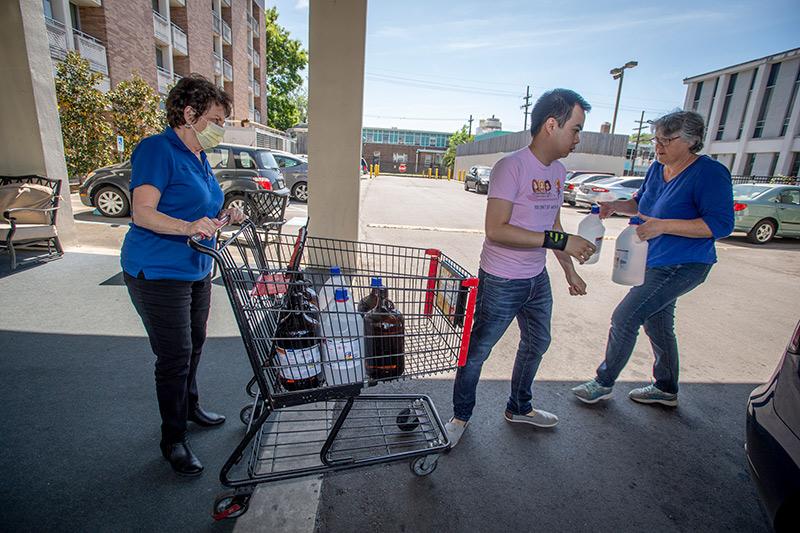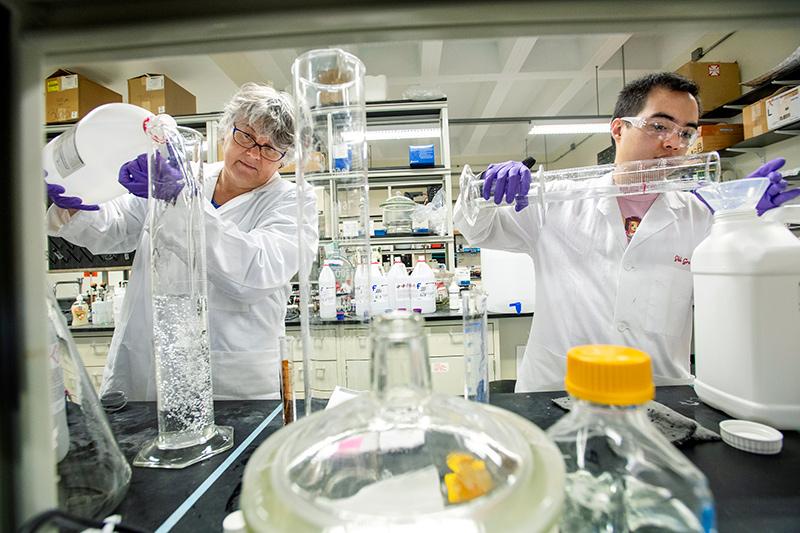Tulane chemistry department makes hand sanitizer, donates to healthcare facilities and nursing homes
As hospitals and healthcare workers are in urgent need of personal protective equipment (PPE) and supplies, several departments and organizations at Tulane University are doing their part to help, including the Department of Chemistry.
Corinne Gibb, Tulane research associate, and Paolo Suating, Tulane PhD student, have been making hand sanitizer in the chemistry department’s lab and giving it to local healthcare facilities and nursing homes.
The idea stemmed from Twitter, Gibb said.
Bruce Gibb, professor of organic chemistry at Tulane, principal investigator of The Gibb Group and Corinne’s husband, noticed other chemistry professors, researchers and principal investigators on Twitter were posting about donating their PPE and stocks of ethanol to the National Health Service in the United Kingdom. Others were posting that they were using their ethanol to make hand sanitizer to donate.
So, Bruce Gibb proposed the idea to Russell Schmehl, professor and chair in the Department of Chemistry, and School of Science and Engineering Dean Kimberly Foster to use their ethanol to make hand sanitizer to donate to local facilities in need. Upon Schmehl and Foster’s approval, Corinne Gibb and Paolo Suating volunteered for the effort.
“Paolo and I do research together, and it made sense for us to keep doing something together,” Corinne Gibb said.
Suating found the World Health Organization’s hand sanitizer recipe, and with the help of Troy Bryant, the chemistry department’s stockroom supervisor, they began searching the stock room for supplies.
“We were basically going through all the little corners of our stock room with him to find containers and chemicals that we could use,” Corinne Gibb said.
Over the span of a few days, Suating and Gibb used the Tulane chemistry department’s ethanol to create 125 gallons of hand sanitizer, most of which was given to the Tulane Medical Center (TMC). They delivered the rest to local assisted living facilities Lambeth House — where several COVID-19 cases have been reported — and Chateau de Notre Dame, who also plans to share with other facilities managed by the Archdiocese of New Orleans. A donation was also given to Tulane’s Campus Health.
“They definitely appreciate the effort that we put into making it for them,” Suating said of the facilities when they received the donations.
Suating added it’s not complicated to make the sanitizer and it didn’t stray far from the research they typically do.
“The lab’s research is essentially organic chemistry in water. We try to model and study the interactions with things that are dissolved in water,” he said. “In a way, we’re sort of using our expertise in water chemistry with what we did with the hand sanitizer.”
Corinne Gibb thought it was a “logical step” for them to take.
“It’s the least we can do, it’s very safe, and there’s no point in keeping all those supplies in storage during the crisis,” she said.
The two will try to get more ethanol to continue making more sanitizer but are cognizant there is a high demand for it, and do not want to compete with other facilities that need it.
For the time being, they are happy to help where they can.
“It’s a win-win because I get to help where I’m needed…and I have something to do while everything is standing still,” Suating said.
“It makes you feel good to try to do your share and I hope we can do more” Corinne Gibb said.


